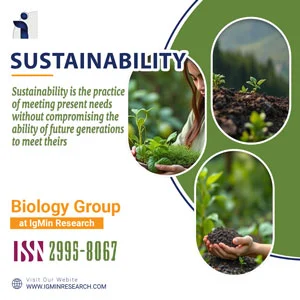Open Access Policy refers to a set of principles and guidelines aimed at providing unrestricted access to scholarly research and literature. It promotes the free availability and unrestricted use of research outputs, enabling researchers, students, and the general public to access, read, download, and distribute scholarly articles without financial or legal barriers. In this response, I will provide you with an overview of the history and latest resolutions related to Open Access Policy.
About
Advancing Sustainability Research with IgMin
Sustainability plays a crucial role in addressing global challenges related to climate change, natural resource management, and ecological balance. At IgMin Research, we provide an international platform for researchers, academics, and professionals to share groundbreaking insights through our sustainability journal submission portal.
We invite authors to submit sustainability research papers that explore innovative solutions in areas such as environmental science, green technology, sustainable development, energy systems, agriculture, and urban planning. All submissions undergo a rigorous peer-review process to ensure the highest quality in sustainability research publishing.
For a fast and simplified publishing experience:
Submit via our Quick Submission Form
Follow our Manuscript Guidelines here
Submit your full paper through our portal
Join the global effort toward a more resilient and sustainable future by publishing your work with IgMin Research.
Editors
Biology Group (4)
Open Access Policy refers to a set of principles and guidelines aimed at providing unrestricted access to scholarly research and literature. It promotes the free availability and unrestricted use of research outputs, enabling researchers, students, and the general public to access, read, download, and distribute scholarly articles without financial or legal barriers. In this response, I will provide you with an overview of the history and latest resolutions related to Open Access Policy.
Open Access Policy refers to a set of principles and guidelines aimed at providing unrestricted access to scholarly research and literature. It promotes the free availability and unrestricted use of research outputs, enabling researchers, students, and the general public to access, read, download, and distribute scholarly articles without financial or legal barriers. In this response, I will provide you with an overview of the history and latest resolutions related to Open Access Policy.
Open Access Policy refers to a set of principles and guidelines aimed at providing unrestricted access to scholarly research and literature. It promotes the free availability and unrestricted use of research outputs, enabling researchers, students, and the general public to access, read, download, and distribute scholarly articles without financial or legal barriers. In this response, I will provide you with an overview of the history and latest resolutions related to Open Access Policy.

Why publish with us?
Global Visibility – Indexed in major databases
Fast Peer Review – Decision within 14–21 days
Open Access – Maximize readership and citation
Multidisciplinary Scope – Biology, Medicine and Engineering
Editorial Board Excellence – Global experts involved
University Library Indexing – Via OCLC
Permanent Archiving – CrossRef DOI
APC – Affordable APCs with discounts
Citation – High Citation Potential
Which articles are now trending?
Research Articles
- Improved Energy Valley Optimizer with Levy Flight for Optimization Problems
- Communication Training at Medical School: A Quantitative Analysis
- How Increased CO2 Warms the Earth
- Effect of Additive Manufacturing Parameters on 316L Mechanical and Corrosion Behavior
- Adaptation of the Physical Literacy Scale for Adults into Turkish and Examination of its Psychometric Properties
- The Influence of Dynamical Downscaling and Boundary Layer Selection on Egypt’s Potential Evapotranspiration using a Calibrated Version of the Hargreaves-samani Equation: RegCM4 Approach
Advertisement















